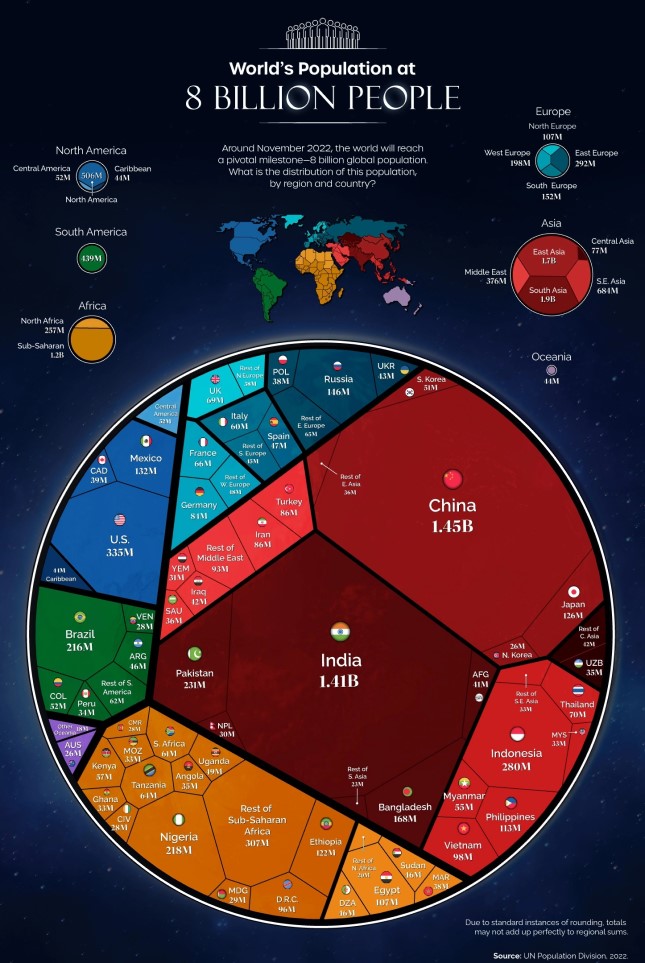Demographic research is a truly fascinating field of knowledge that allows us to predict and influence the relationship between mankind and nature, and as if observe human history from above. However, the way this knowledge is used by the governments and international organizations that monitor and try to control demographic tendencies still raises questions.
Just 70 years ago our planet was inhabited by only 2 billion people. According to a UN report from last month, humanity has now reached the 8-billion milestone.
This brings with it the tired narrative that certain poor African countries are the most fertile and that such “sustained rapid population growth can thwart the achievement of the Sustainable Development Goals (SDGs), which remain the world’s best pathway toward a happy and healthy future.” Thus, the concept of overpopulation is left unquestioned, as is the concept of happiness, which we will all achieve one day if we could only decrease fertility in developing countries.
The same report goes on to say that that those “overpopulated” countries do not actually harm the planet as compared to those where income per capita is higher and which have “the highest per capita consumption of material resources and emissions of greenhouse gas emissions.”

In other words, population growth is much slower in the countries with the highest CO2 emission, while overpopulated countries truly have minimal impact on a global scale.
So according to the UN report, we still have two major evils: population growth and climate change, and they are not directly related to each other. Or maybe they are: if we manage to reduce fertility in certain African and Asian countries (the leaders are the Democratic Republic of the Congo, Egypt, Ethiopia, India, Nigeria, Pakistan, the Philippines, and the United Republic of Tanzania) and develop these countries, will we really not face an even worse global picture?
And in the end, one can't help but wonder, is overpopulation really such a problem for the whole planet? Or maybe this is a fictional category, used as instrument for the West to manipulate the rest of the world?
It is no secret that the decline in population growth in European countries is due to technological advances. Back at the turn of the 18th and 19th centuries, it was common in European families to have up to ten children. But many children did not survive. The mortality rate was high—up to 250 out of every 1,000 newborns died before their first birthday in mid-19th-century Europe.
With the development of medicine and technology, mortality rates declined, thus opening the gap between fertility and mortality. This process is commonly known as the first demographic transition that led to rapid population growth.
Today, high newborn mortality has been overcome and life expectancy has been increased everywhere, but fertility has also declined dramatically in developed industrial countries, which signifies the second demographic transition, after which population growth stops.
Non-European countries, especially those that were in colonial dependence at the beginning of the 20th century, simply did not have the opportunity to develop their own technology and therefore missed the moment. For example, many of the jobs that are done by robots or machines in Europe are done by people in India. Human labor is much cheaper than using technology that was invented abroad and has to be bought at a higher price. It is this need for human labor that keeps population growth going in such countries.
In general, the UN believes that we are living in an era of population growth that will soon end, and that the decline in population growth can be stimulated through various regulatory mechanisms and programs. At the same time, it is predicted that global population growth will stop only after 2100, peaking at about 10.4 billion people.
The UN birth control program seems to be unconsciously trying to make other parts of the world become like the West. As the pioneering postcolonial philosopher Frantz Fanon put it: there is only one way for a black man—to be white. But it is doubtful that simply handing out condoms or other methods of sex education will have any real, positive effect on these countries. Still, they should be part of the Western world and develop within its program and vision for a global "happy future.”
The basic idea is that all countries have to achieve a balance in mortality and fertility, and only then can we begin to reduce the population (by 2300 it could be back to 3 billion). This reasoning sounds like the fantasy of a bright and peaceful utopia. Or maybe it's just a new form of the old colonial paradigm of cultivating an irrational and fertile remnant of humanity?
Yes, it is obvious that modern forms of education, such as gender equality and healthcare, help reduce fertility. But then again, is it good for the environment when it is polluted by "enlightened" societies? While scientific demographers try to monitor change using statistics, the results are often used either by partisan demographers or by political organizations that want to artificially try to control the fertility cycle in developing countries.
And they even succeed: the UN's utopian vision of world equilibrium understands that such changes can only be achieved on a broader global scale. And yet, why don't Western countries address their own fertility and environmental problems? Why intervene in the policies and demographics of other countries? I think the answer here is obvious.
One last thing, regarding predictions: first, the earth easily holds the present 8 billion, and a huge amount of territory remains unoccupied. And secondly, the brutal experiences we are undergoing today—the pandemic, wars, and climate change—are unlikely to impact the big picture. And in some cases, on the contrary, they even lead to positive statistics.
It is curious that, so far, episodes of abnormal heat waves in Europe have not been reflected in an increase in mortality, but rather a decrease. Similarly, demographers are ambivalent about the consequences of the pandemic. Despite the colossal losses, medicine is gradually getting better and adapting to new conditions, so it is likely that mortality will not increase.

































